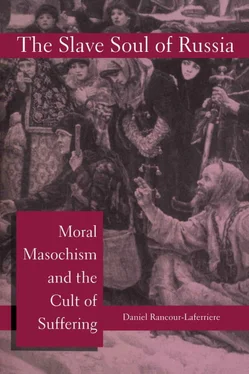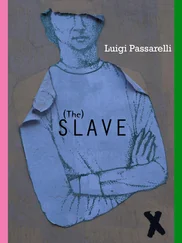The real focus of this author’s research was not masochism, however, but “national character.” As a result, his observations on Russian masochism were somewhat parenthetical and unsystematic. Similarly, others who have made assertions about the existence of masochism in Russia have not followed through with a detailed examination of this phenomenon. 22Thus, although the hypothesis of Russian masochism does not originate with me, I do hope to contribute: (1) massive documentation of evidence for the hypothesis from a wide variety of spheres—historical, political, folkloric, literary, and so on, and (2) systematic, in-depth explorations in several narrowly defined areas, such as the folklore of Ivan the fool, the Russian bathhouse culture, the attitude of women toward men, and the attitude of Russians toward the collective. These explorations, in turn, will lead to a general claim about the maternal nature of the object toward which the Russian self takes a masochistic stance.
This book is about both images and realities. At one moment I may call up the emblem of the long-suffering Russian mother in a poem by Aleksandr Blok, the next I may cite statistics showing that the average Soviet woman put in nearly twice as many hours per week of labor as her husband did. The poetic image and the everyday reality are not always directly related, of course, but I think both need to be considered if there is to be an adequately broad psychological understanding of masochism in Russia.
The poetic versus the literal meanings of the very word “slave” offer an instructive example. Every person in traditional tsarist Russia was supposed to be a “slave of God” (“rab bozhii,” as in the old proverb “Vse my raby Bozh’i [We are all slaves of God]”). 23This metaphor was very ancient and very ordinary. The Academy dictionary of Russian defines the expression not only as “a Christian,” but also as “a human being generally (from the religious notion of the total dependence of a person on God).” 24The corresponding feminine form, “female slave of God” (“raba bozhiia”) referred not only to a woman Christian, but to a woman generally. 25
The anarchist Mikhail Bakunin was thus only expressing a tautologous conclusion from ordinary Russian linguistic usage when he declared: “If God exists, the human being is a slave [Esli Bog est’, chelovek—rab].” 26Maksim Gor’kii, on the other hand, didn’t mind God’s existing as long as humans—Russian humans in particular—didn’t have to be slaves into the bargain. Referring to the condescending generosity of God described in chapter 40 of the book of Job, Gor’kii exclaims: “Whenever I read this chapter, I shout out in my mind to my own fellow-Russians: just stop being slaves of God [da perestan’te zhe vy byt’ rabami bozh’imi]!” 27
The use of the word “slave” in these contexts is metaphorical and is intended to convey a certain psychological attitude of dependence and submissiveness before God. The metaphor is presumably based on intuitions concerning the attitudes and feelings that real slaves experience with respect to their real masters. As it turns out, these intuitions are quite accurate.
Real slaves existed in Russia well into our own century. There has been much variation over time and geographic location, of course, in the extent to which Russians have been enslaved. Technically, Russia has had both slavery (until 1723, then renewed in the Soviet period as forced labor) and serfdom (until 1861). Some scholars see little difference between true slavery and serfdom as it existed in Russia after the mid-eighteenth century. Under different sociopolitical conditions the Russian slave has been variously referred to as “rab,” “kholop,” “krepostnoi” (serf), and “zek” (convict, slave laborer). Curiously, the first two of these terms were also applied to Russian nobles in their relationship to the tsar during certain historical periods. The multifarious technical ways in which all these terms differ from one another will not be a concern of this book, nor will the socioeconomic, political, and demographic factors contributing to various enslavement practices in Russia. 28Rather, my concern will be the masochism of Russians generally, many of whom happen to be literal slaves.
For the most part the Russian slave was indeed slavish. But the slave could also be defiant. This can be seen, for example, in various cultural practices, such as satirical folklore in which the peasant turns the tables on the landowner. 29Defiance could also be manifested in criminal activity, such as stealing grain or timber from the landowner. Or there were more serious manifestations, such as the large uprisings (e.g., the famous one led by Emelian Pugachev in 1773–74), or smaller disturbances (so-called “volneniia”), or escapes. Sometimes rebellious peasants proffered the cunning excuse that the “tsar-father” was on their side. 30But direct resistance to enslavement was, in any case, the exception, not the rule. As Peter Kolchin has pointed out, for example, most Russian serfs did not engage in “volneniia,” otherwise serfdom could not have been maintained. 31
Historians are understandably attracted to the various uprisings and rebellions which took place over the centuries in Russia. These are “events” which left extensive paper trails, while the ordinary, everyday slavishness of Russians constituted a distinct nonevent. From a psychoanalytic viewpoint, however, the rule is no less interesting than the exception. 32
Much evidence is available on slavish attitudes in Russia, some of it going back centuries. In the mid-seventeenth century Adam Olearius, who had traveled in Russia, summed up his observations on Russian servility as follows:
They are all serfs and slaves. It is their custom and manner to be servile and to make a show of their slavish disposition. They bow to the ground to notables, and even throw themselves at their feet. They give thanks for beatings and punishments. All subjects, whether of high or low condition, call themselves and must count themselves the Tsar’s kholopi , that is slaves and serfs. Just as the magnates and nobles have their own slaves, serfs, and peasants, the princes and the magnates are obliged to acknowledge their slavery and their insignificance in relation to the Tsar. They sign their letters and petitions with the diminutive form, such as Ivashka instead of Ivan, or “ Petrushka, tvoi kholop [Petrushka, your slave].” 33
About half a century earlier another traveler, Giles Fletcher, made rather similar observations:
Into what seruile condition their libertie is brought, not onely to the Prince, but to the Nobles, and Gentlemen of the Countrie (who themselues also are but seruile, specially of late yeares) it may farther appeare by their owne acknowledgments in their supplications, and other writings to any of the Nobles or chiefe officers of the Emperours. Wherein they name and subscribe themselues Kolophey , that is, their villaines, or bondslaues: as they of the Nobilitie doo vnder the Emperour. This may truely be saide of them, that there is no seruant nor bond slaue more awed by his Maister, nor kept downe in more seruile subjection, then the poore people are & that vniuersally, not only by the Emperour, but by his Nobilitie, chief officers, and souldiers. So that when a poore Moujick meeteth with any of them upon the high way, he must turne himselfe about, as not daring to looke him on the face, and fall downe with knocking of his head to the very ground, as he doth unto his Idoll. 34
This behavior obviously signifies a masochistic psychological attitude in the slave who performs it. The kowtowing Fletcher describes was called “chelobitie” in Russian, literally “beating the forehead.” Nowadays the word has acquired the metaphorical meaning of “petition” or “request.” But it was originally—and in some contexts still is—a literal, physical bowing down, so low that the forehead would strike against the ground and possibly be injured. Other travelers’ accounts from the sixteenth century, as Ronald Hingley points out, report that Russians “would happily exhibit the bumps on their foreheads raised through excess of zeal in executing the kowtow.” 35During the late Soviet period I actually observed athletic old women hammering a stone floor with their foreheads as they prayed before icons in one of the churches of Zagorsk. The Russian fool, according to a proverb, will go to extremes in this matter: “Make a fool pray to God, and he will break his forehead” (“Zastav’ duraka Bogu molit’sia, on i lob razob’et”). 36
Читать дальше












